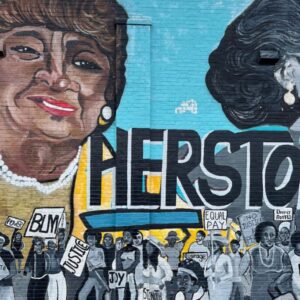
The Heritage Foundation, perhaps best known today as the architect of Project 2025, has long shaped conservative policy in the United States. The Oversight Project, once an initiative of the Heritage Foundation and now its own 501c4 entity, is best known for using public records requests and legal action to target what it unilaterally deems to be government overreach or misconduct.
Since its creation in 2000, the Oversight Project has launched more than 100,000 Freedom of Information Act (FOIA) requests from federal offices and agencies and more than 100 lawsuits against the Joe Biden administration. The group has specifically requested documents from government leaders that mention key terms like “climate equity,” “voting,” or “SOGIE” (sexual orientation, gender identity, and expression).
The request for syllabi appears to be an example of conservative groups targeting UNC system schools for continuing its DEI practices despite attempts by the UNC system Board of Governors to quell them.
Now, the latest target appears to be university professors within the University of North Carolina (UNC) system. As Ryan Quinn, author of a recent Inside Higher Ed article, writes: “According to Chapel Hill’s open records request database, Mike Howell, the Oversight Project’s president, submitted a sweeping request to the university on July 2, asking for syllabi and class materials presented to students in roughly 70 courses…”
Citing President Donald Trump’s anti-DEI executive orders from earlier this year, Howell noted in a statement that “disclosure of these records will contribute significantly to the public’s understanding of university operations and student-facing programing, particularly considering ongoing public concern regarding institutional compliance with current Executive Orders issued by the President of the United States.”
Howell also alleged that the records “will shed light on potential inconsistencies between internal practices and public representations made by officials in a matter of substantial national importance.”
The courses that were targeted for FOIA records requests contained terms like “Diversity, Equity, Inclusion, and Belonging,” “gender identity,” “intersectionality,” “white privilege,” “cultural humility,” “implicit bias,” ”microaggressions,” “queer,” and “sexuality.”
According to Inside Higher Ed, Howell asked the university to also search courses including Gender and Sexuality in Islam, Increasing Diversity in STEM Research, Black Families in Social and Contemporary Contexts, and Right-Wing Populism in Global Perspective.
The request for syllabi appears to be an example of conservative groups targeting UNC system schools for continuing its DEI practices despite attempts by the Board of Governors to quell them. In fact, earlier this year, the board ordered its 16 public universities to stop requiring “course credits related to diversity, equity, and inclusion.” The system also granted institutional chancellors the ability to allow waivers for dozens of courses with diversity themes that were necessary for the completion of degrees.
At many public universities, syllabi are deemed intellectual property. Thus, professors are not required to share them in response to public records requests.
Among the professors whose syllabi received a FOIA is Chris Petsko, an assistant professor of organizational behavior, who teaches a business course entitled Leading and Managing. Petsko noted that a small part of his course deals with sections on stereotyping and prejudice and how they impact workplace outcomes, like hiring practices.
In a LinkedIn post at the end of July, addressing the request for his syllabus, Petsko said that his initial response was concern and his second was frustration. He asserted, based on his own research that:
- At many public universities, syllabi are deemed intellectual property. Thus, professors are not required to share them in response to public records requests.
- Records requests, like the one he received, often seem to imply that professors who teach about DEI topics are “on thin ice” and on the verge of engaging in activity that is against the law.
- Professors at public universities have legal rights when it comes to teaching that have been affirmed by a Supreme Court precedent.
- At public universities, instructors have a legal right to decide how to teach their course and what topics to include. This right extends even to those who teach about topics that are deemed to be politically sensitive, like intersectionality, racial discrimination, sexuality, etc.
Petsko also addresses fellow professors directly, telling them that they should know what they cannot do legally. For instance, they cannot compel their students to hold their political views or discriminate against students for their political views. They cannot engage in partisan activity or break Family Education Rights and Privacy Act (FERPA) laws.
“When you look at all of this side by side, I think you’re left with a pretty straightforward conclusion: Keep doing the work you were trained to do,” Petsko wrote. “Keep educating others. Keep sharing your expertise. And don’t let vague references to executive orders make you question whether you have a right to be sharing your knowledge with the world.”














